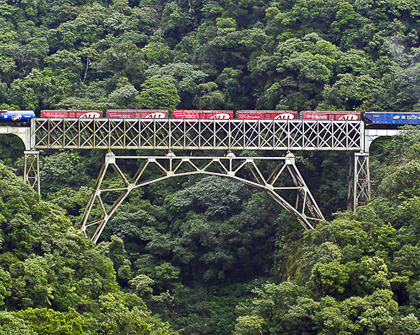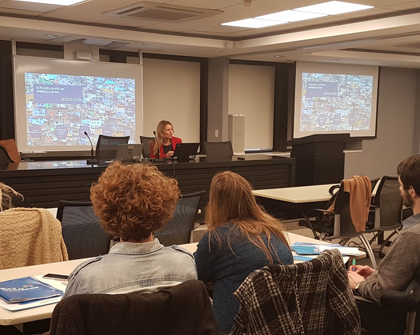On August 11 and 12, 2016, the Executive Technical Group on Trade Integration through Postal Services for MSMEs (link in Spanish) met in Montevideo as part of the COSIPLAN/IIRSA Work Plan. The meeting was coordinated by INTAL and it aims were to share knowledge and experience on trade facilitation processes and define the next steps to be taken to contribute to trade integration through each country’s postal service at the regional level.
The meeting was attended by representatives from Argentina, Bolivia, Brazil, Chile, Colombia, Ecuador, Paraguay, Peru, Uruguay, and Venezuela, and INTAL in its role as Secretariat of the COSIPLAN/IIRSA Technical Coordination Committee. Also present were representatives from Guatemala, Mexico, Panama, the World Customs Organization (WCO), the Universal Postal Union (UPU), and the Postal Union of the Americas, Spain, and Portugal (UPAEP).
Trade Facilitation for MSMEs
Experts from the UPU, the WCO, and ALADI took part in the first day of the event, at which they discussed global trends in the integration of MSMEs into international trade, and trade facilitation using postal logistics and technological tools.
In this context, the IDB presented the ConnectAmericas website as a platform that promotes the use of information technology to help small companies go international. A committee of government officials from Ecuador, Peru, and Uruguay was created, which will work together with the IDB team to create a community within this website called “Exporta Fácil for MSMEs”. The countries stressed the importance of having this sort of space, as one of the main obstacles that small companies are up against when trying to export is the lack of information on buyers and reliable spaces where people from other markets can get to know them. The delegations present recognized that SMEs that manage to start exporting become better companies, increase the quality of their products, sell more, are more productive, and employ more people while paying better salaries.
The UPAEP presented an international trade facilitation project for MSMEs from its member countries. This four-year project will help improve the Exporta Fácil and Importa Fácil programs in countries that already operate this service, and the implementation of these in countries that wish to do so. It will use training, outreach, and communications tools to achieve this.
Exporta Fácil Is Making Progress in South America
As part of the agenda, those present reviewed the activities that had taken place the previous year so as to assess the headway that had been made in implementing the project. Ecuador presented the results of the monitoring visit that took place in November 2015, emphasizing the progress, challenges, and prospects of the Exporta Fácil project there. Ecuador’s Ministry of Trade launched the new Exporta País Program, which aims to provide individualized training and technical assistance to Ecuadorian companies, especially MSMEs, and to organizations that form part of the social and solidarity economy by improving their processes and exportable supply.
Paraguay commented on the development of the Exporta Fácil program there, which began with a visit in 2015 and the prediagnostic report. Support for this work comes from a team of government officials from countries that are already operating the service, through an IDB Technical Regional Cooperation program administered by INTAL. June 2016 saw the implementation visit to Paraguay, the objective of which was to provide support for the local team in designing Work Plans to implement the Exporta Fácil program. The different government agencies that make up the project’s interinstitutional committee set November 2016 as a tentative date for MSMEs to start exporting via this system.
ProChile presented the progress that had been made in the context of the Pacific Alliance. Its aim was to assess the integration and harmonization of the Exporta Fácil program within Pacific Alliance member countries so as to reduce red tape, facilitate export processes, reduce international shipping costs, and increase trade within the Pacific Alliance.
The results of the Exporta Fácil program were analyzed following the compilation and calculation of indicators for the project that were defined at the last GTE meeting. These indicators play an important part in enabling an analysis of whether the main objectives of the project are being met in each country and in being able to compare their different outcomes. Some of the more noteworthy preliminary results of the use of the Exporta Fácil program in the region are: i) the cumulative increase of 327% in the destinations of shipments from Uruguay from when the program began in 2009 up to now; ii) the fact that the three main cities in Colombia account for 81% of all exports, on average, for the last four years; iii) the low share of shipments from Peru to other countries in South America in comparison to its shipments to the rest of the world, which stands at 16% for the last three years; iv) the considerable drop in shipments from Ecuador in 2015, around 70% in terms of both quantity and FOB value; and v) the increase in shipments within Peru, which rose 28% in 2015, although total shipments fell by 13% in the same period.
Actions to Strengthen Trade Integration through Postal Services
The countries analyzed the 2016 Work Plan through a practical exercise that enabled them to identify the obstacles that arose when implementing planned activities. In order to strengthen their commitment to the actions that form part of the 2017 Work Plan, the delegations agreed to sign the Montevideo Pact. The agreement envisages that the COSIPLAN National Coordinators and high-level authorities in each institution involved in the system will be kept informed of the progress and needs of this GTE, and sets out the actions needed to carry out the initiatives that have been defined.
The 2017 Work Plan includes initiatives in four main areas: Exporta Fácil and Importa Fácil, the connectivity pilot scheme, dissemination of information, and coordination with UPU/UPAEP. To move forward with this work, some countries were made responsible for developing a work calendar and coordinating each initiative.
The delegations present praised INTAL’s part in coordinating the project and providing support to countries in implementing this tool throughout the region and in publicizing the GTE’s achievements. INTAL functions as the permanent Secretariat of the COSIPLAN/IIRSA Technical Coordination Committee.





